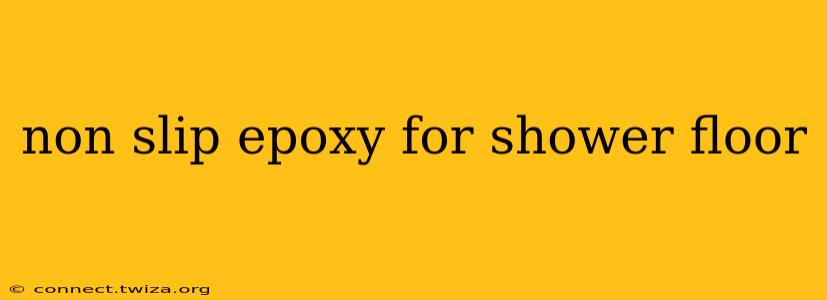Choosing the right epoxy for your shower floor is crucial for both safety and aesthetics. A slip-resistant surface is paramount, especially in wet environments. This guide will explore the world of non-slip epoxy coatings, helping you make an informed decision for your next shower renovation or installation.
What is Non-Slip Epoxy for Shower Floors?
Non-slip epoxy for shower floors is a two-part resin system that cures to form a hard, durable, and waterproof surface. Unlike traditional tile grout, which can become porous and harbor mildew, epoxy provides a seamless, easy-to-clean finish. The key difference with non-slip epoxy is the inclusion of aggregates or textured additives that increase the surface friction, significantly reducing the risk of slips and falls.
Why Choose Non-Slip Epoxy for Your Shower?
There are several compelling reasons to opt for non-slip epoxy in your shower:
- Safety: This is the primary benefit. The textured surface dramatically reduces the risk of slipping, making it ideal for homes with children or elderly individuals.
- Durability: Epoxy is incredibly tough and resistant to cracking, chipping, and staining, outlasting many other shower flooring options.
- Water Resistance: Completely waterproof, epoxy prevents water damage and the growth of mold and mildew.
- Aesthetics: Epoxy can be customized with a wide range of colors and finishes, allowing for a truly unique shower design.
- Easy Maintenance: A simple cleaning with soap and water keeps your epoxy shower floor looking pristine.
- Seamless Finish: Unlike tiled showers, epoxy creates a seamless, joint-free surface, preventing water from seeping into cracks.
What are the different types of non-slip epoxy for shower floors?
There isn't a specific "type" of epoxy that's inherently non-slip. The non-slip property comes from the addition of aggregates to the epoxy resin. These aggregates can vary, impacting the level of slip resistance and the final appearance. Common aggregates include:
- Quartz: Offers a subtle texture and a wide range of color options.
- Aluminum Oxide: Provides excellent slip resistance, especially in high-traffic areas.
- Silica Sand: Creates a more pronounced texture. The grain size of the sand will influence the level of slip resistance.
The choice of aggregate depends on your desired level of slip resistance and aesthetic preferences.
How is non-slip epoxy applied to a shower floor?
Applying non-slip epoxy requires careful preparation and precise application. It's generally recommended to hire a professional for this task, as improper application can compromise the durability and slip resistance of the final finish. The process typically involves:
- Surface Preparation: Thoroughly cleaning and preparing the shower floor substrate is crucial for proper adhesion.
- Epoxy Mixing: Mixing the two components of the epoxy resin according to the manufacturer's instructions.
- Application: Spreading the mixed epoxy evenly across the shower floor, incorporating the chosen aggregate.
- Curing: Allowing the epoxy to cure completely according to the manufacturer’s specifications. This process can take several days.
Is non-slip epoxy suitable for all shower floor types?
Non-slip epoxy can be applied to various shower floor substrates, including concrete, plywood, and existing tile (with proper preparation). However, always check the manufacturer's instructions to ensure compatibility with your specific substrate. Existing tile often requires additional preparation, potentially including removing grout and ensuring a sound bond.
How much does non-slip epoxy for a shower floor cost?
The cost of non-slip epoxy for a shower floor varies based on factors like the size of the shower, the type of epoxy used, and labor costs (if hiring a professional). Expect to pay a price that's competitive with high-end tiling options, but remember that epoxy typically offers higher durability and easier maintenance in the long run.
How long does non-slip epoxy for shower floors last?
With proper installation and maintenance, a non-slip epoxy shower floor can last for many years, often outlasting other flooring materials. Its durability and resistance to water damage contribute significantly to its longevity.
This comprehensive guide provides a strong foundation for understanding non-slip epoxy for shower floors. Remember to always consult with professionals for installation and to select products that meet your specific needs and safety requirements.
